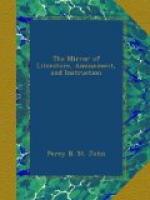The Editor’s Conclusion, or Summary of the Year is likewise worthy of extract:
“The curtain of the year 1830 dropped on Europe in a state of ferment and agitation, of which it was impossible to check the progress or to foretell the result. The masses of the population had been stirred up from the bottom by the concussion of the French and Belgic revolutions, and could not be expected for a long time to subside into order, or resume a determinate arrangement according to their weight and affinities. The partition wall of privilege, rank, or subordination, interposed between different classes of the European community, had in some cases been forcibly broken down, and in others had been more silently undermined. Antiquity, custom, usage, or legitimacy, which formerly became a shelter to abuses, could not now protect justice and right from threatened innovation. Everywhere power was challenged on its rounds, and compelled to give the popular watchword before it could be allowed to pass. Whether it was a nation that demanded its independence from a foreign power, as in Belgium and Poland; or a people that cashiered their dynasty, as in France and Saxony; or a parliament that changed its administration for a more popular party, as in England; or republics that liberalized their institutions, as in Switzerland,—all was movement and change. The breath of revolution sometimes blew from the suburbs of a capital, as in France; sometimes from the cottages of the peasant, as in the Swiss mountains; but it was every where powerful. No institution was held venerable, no authority sacred, that stood in the way of the popular will. The people had every where got a purchase against their rulers, and had fixed their engines for a further pull. The power of domestic military protection had diminished, in proportion as rulers required its aid; while, at the same time, all Europe seemed arming for a general trial of strength, or a recommencement of conquest. Every kind of reform was the order of the day; financial reform, legal reform, ecclesiastical reform, and parliamentary reform. The year that has just commenced must resolve the character of many of those vague tendencies to change, to war, and confusion, which alarmed some and inspired hope into others at the close of 1830.”
* * * * *
NOTES OF A READER.
* * * * *




